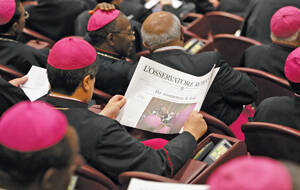Cardinal George Pell of Sydney, Australia, urges that the New Evangelization use the examples of newly canonized saints to reach the spiritually hungry. Cardinal Donald Wuerl of Washington says the New Evangelization can benefit from the church’s social outreach to the sick and the poor, efforts that make the church “the very presence of Christ in the world today.” Bishop Gerald Kicanas of Tucson suggests that it is the progressive messages of the church’s social justice teaching that will enliven the New Evangelization. Hearing those observations about the nature of the New Evangelization, as a global synod dedicated to professing it convened in Rome in October, it may be fair to ask exactly how the “new” evangelization differs from the “old.”
Bishop Kicanas’s synodal experience offers some insight into the question. In a series of blog posts from Rome, Bishop Kicanas offered something really new, a uniquely transparent experience of church leaders grappling with the challenge of the New Evangelization and trying to come to terms with its meaning themselves. His frequent digital dispatches were themselves another marker of the new. Bishop Kicanas used one of the latest communication forms of the Internet age to facilitate his outreach in digital epistles to the members of his home diocese but also the entire Christian world.
“New evangelization is a phrase first used by Paul VI in ‘Evangelii Nuntiandi,’” Bishop Kicanas wrote in an e-mail message from Rome, “and taken up by Pope John Paul II and Pope Benedict XVI. New evangelization begins with ourselves as practicing Catholics, inviting us to deepen our relationship with Jesus Christ. It extends to those who have left the church, whom we miss, inviting them to come back home. It reaches out to those who have not met the Lord inviting them to encounter Jesus Christ. This synod touches everyone, calling all to awaken the faith, to discover what the church teaches and to inspire others to know Jesus Christ.”
The bishops at the three-week-long synod, which ended on Oct. 28, also discussed the challenges facing the New Evangelization. Cardinal Wuerl’s opening address on Oct. 8 included a critique of modern culture, warning that a “tsunami of secularism” threatened to wash away the West’s foundational Christian tradition.
The proceedings were also not without controversy. Cardinal Peter Turkson of Ghana, president of the Pontifical Council for Justice and Peace, generated some consternation with a surprise presentation: an eight-minute video gleaned from YouTube that compared birthrates between native-born Europeans, about 1.8 per woman, to the birthrates of Muslim immigrants to Europe, about 8.1. Among the many dire possibilities held up in the video was the specter of France as an Islamic republic within four decades.
Bishop Kicanas shared a couple of more edifying moments from the Synod. The session on Oct. 19, he said, “ended with the loudest and most prolonged applause from the synod floor yet.” A young catechist from Italy, Tommasso Spinelli, had addressed the bishops. “He urged priests to be proud of their priesthood, to know they matter,” Bishop Kicanas said. The young layman told those assembled that priests should be attentive to their celebration of the liturgy and not to be hesitant to challenge young people who want to grow in their relationship with Jesus Christ. Priests must be the guides.
“The passion and sincerity of his words touched the hearts of the synod fathers,” Bishop Kicanas said. “It gave a hint of how the young can be the source of the New Evangeli-zation. They can inspire and encourage their peers and even their elders, as Tommasso did with the bishops, on the importance and deepening of faith.”
Bishop Kicanas said he also found the synod’s opening reflection from Pope Benedict XVI deeply moving. “This elderly man spoke passionately and with vigor, without any notes, on confession and charity as roots of the New Evangelization,” he said. “The wise teacher obviously was grasped by the message he was presenting. His strong gestures and clear thoughts were captivating.... He called Catholics to confess out loud and make public what is in their hearts. We need courage to utter the word. He called us to sing out our faith.”
The pope, said Bishop Kicanas, “reminded us that faith does not remain in church, but we take our faith out into the street in works of charity. Works of charity and justice are at the heart of the new evangelization.”








